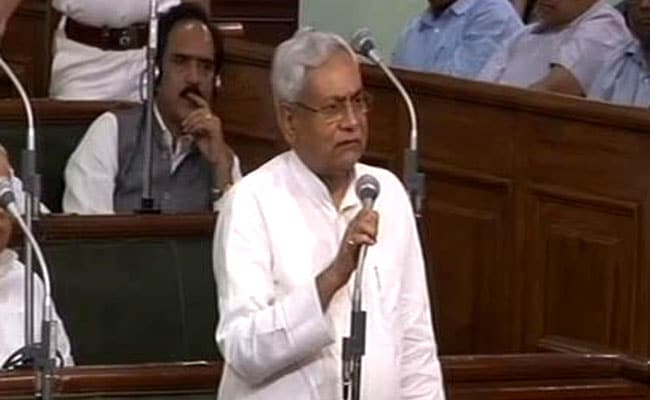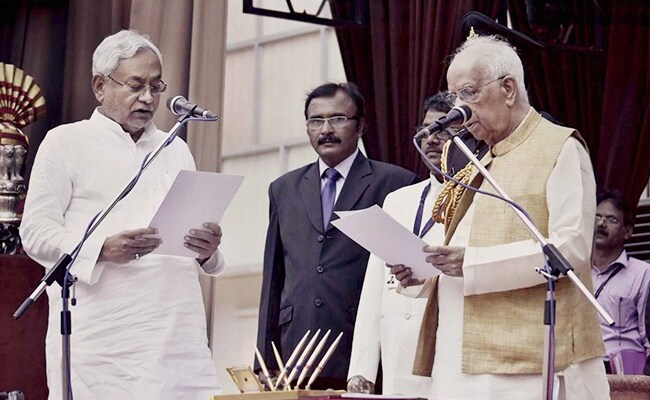
Nitish Kumar ended his partnership with Lalu Yadav and Congress and joined hands with BJP
- Lalu Yadav was told of alliance ending on the phone
- Nitish Kumar broke the news 10 minutes before he resigned
- Nitish Kumar returned as Chief Minister with BJP as new partner
Did our AI summary help?
Let us know.
Patna:
Barely 10 minutes before he submitted his resignation, Chief Minister Nitish Kumar phoned Lalu Yadav who lives just next door in Patna.
"Lalu-ji, I beg your forgiveness, but after running the government for 20 months, I cannot do it any longer. I am going to quit," the Chief Minister told his ally, who hastily and fruitlessly asked him to reconsider.
Within half an hour the headline on all news channels was that Nitish Kumar had ended his partnership with Lalu Yadav and the Congress. That breaking news was succeeded by the confirmation that Nitish Kumar and the BJP had a refurbished relationship that would see them running Bihar together.
Yesterday, that became official with Nitish Kumar winning a trust vote supported by the BJP. Sushil Kumar Modi returned as his deputy, an arrangement that was in place till 2013. That's when Nitish Kumar cut out of a nearly two-decade-long relationship with the BJP over its selection of Narendra Modi as the presumptive prime minister of its national coalition which included Nitish Kumar's party.
 After Mr Modi collected a whopping victory, Nitish Kumar realised that in the election for Bihar's government, he needed to club with parties whose support groups could combine with his to block the PM from delivering Bihar to the BJP. Enter the "Grand Alliance" which saw the Congress and Lalu Yadav co-signing with Nitish Kumar.
After Mr Modi collected a whopping victory, Nitish Kumar realised that in the election for Bihar's government, he needed to club with parties whose support groups could combine with his to block the PM from delivering Bihar to the BJP. Enter the "Grand Alliance" which saw the Congress and Lalu Yadav co-signing with Nitish Kumar.
The strategy proved skilful and Nitish Kumar returned for a third successive term as Chief Minister, inspiring the opposition to consider a similar Maha-Gatbandhan or interlinking for the 2019 election as the only possible impediment to Mr Modi's re-election, especially after his dazzling sweep of Uttar Pradesh in March this year.
Sources close to Lalu Yadav say that the early signs of Nitish Kumar growing restive with their collaboration came in May when the Chief Minister took his time to accept an invitation to Lalu Yadav's plan for an August rally against PM Modi to be held in Patna. Other opposition leaders including Congress chief Sonia Gandhi said they would be there. The Chief Minister was circumspect about his attendance which meant that the posters and other publicity material announcing the event could not list him. A few weeks later, Nitish Kumar said he would show up.
 Lalu Yadav's suspicions of an impending break-up began to grow but it was only when he was named in a corruption case along with son Tejashwi on July 7 that the ball really got rolling. Nitish Kumar made it clear that he wanted Tejashwi, his 28-year-old Deputy Chief Minister, to resign. If not, he was willing to settle for a public and detailed defense by the young leader. But the Yadavs struck that possibility off the list, despite nudging from Nitish Kumar and messages conveyed through the Congress .
Lalu Yadav's suspicions of an impending break-up began to grow but it was only when he was named in a corruption case along with son Tejashwi on July 7 that the ball really got rolling. Nitish Kumar made it clear that he wanted Tejashwi, his 28-year-old Deputy Chief Minister, to resign. If not, he was willing to settle for a public and detailed defense by the young leader. But the Yadavs struck that possibility off the list, despite nudging from Nitish Kumar and messages conveyed through the Congress .
Finally, on Wednesday, Nitish Kumar ended this iteration of his government, citing his conscience and an atmosphere that he said "will not allow me to work."
The Yadavs have accused him of colluding with the BJP to use the corruption case- which they say is fake- as a cover to end an alliance that no longer suited him. Not because of the collateral damage of the taint of corruption, as Nitish Kumar has alleged, but because he has calculated that the opposition cannot defeat PM Modi in 2019.
Nitish Kumar has not disguised his sentiments. When he chose to support the BJP in the election for President of India last month, he said the opposition, anchored by the Congress, "was in a mess" with no narrative to offer the country other than one that pitches it as "not the BJP". As far back as November, he singled himself out in the opposition by supporting, not attacking, the PM's shock ban on high-denomination notes.
It is clear from how smoothly he transitioned to his updated relationship with the BJP that Nitish Kumar's move was not impulsive. His critics say he has abandoned ideology for opportunism- anything to stay in power. He says "secularism is being cited to deflect from corruption" and is unapologetic about rearranging the political landscape.
For Lalu Yadav, confronting a collection of corruption cases that target his children and him, being ejected from power comes at a time of heightened vulnerability. His aides say he should have seen it coming. The problem is that Lalu Yadav, famous practitioner of repeat-worthy dialogue, thought he could talk his way out of it.
"Lalu-ji, I beg your forgiveness, but after running the government for 20 months, I cannot do it any longer. I am going to quit," the Chief Minister told his ally, who hastily and fruitlessly asked him to reconsider.
Within half an hour the headline on all news channels was that Nitish Kumar had ended his partnership with Lalu Yadav and the Congress. That breaking news was succeeded by the confirmation that Nitish Kumar and the BJP had a refurbished relationship that would see them running Bihar together.
Yesterday, that became official with Nitish Kumar winning a trust vote supported by the BJP. Sushil Kumar Modi returned as his deputy, an arrangement that was in place till 2013. That's when Nitish Kumar cut out of a nearly two-decade-long relationship with the BJP over its selection of Narendra Modi as the presumptive prime minister of its national coalition which included Nitish Kumar's party.

Bihar chief Minister Nitish Kumar spoke in Bihar Assembly before trust vote.
The strategy proved skilful and Nitish Kumar returned for a third successive term as Chief Minister, inspiring the opposition to consider a similar Maha-Gatbandhan or interlinking for the 2019 election as the only possible impediment to Mr Modi's re-election, especially after his dazzling sweep of Uttar Pradesh in March this year.
Sources close to Lalu Yadav say that the early signs of Nitish Kumar growing restive with their collaboration came in May when the Chief Minister took his time to accept an invitation to Lalu Yadav's plan for an August rally against PM Modi to be held in Patna. Other opposition leaders including Congress chief Sonia Gandhi said they would be there. The Chief Minister was circumspect about his attendance which meant that the posters and other publicity material announcing the event could not list him. A few weeks later, Nitish Kumar said he would show up.

Nitish Kumar took oath as the Bihar Chief Minister on Thursday.
Finally, on Wednesday, Nitish Kumar ended this iteration of his government, citing his conscience and an atmosphere that he said "will not allow me to work."
The Yadavs have accused him of colluding with the BJP to use the corruption case- which they say is fake- as a cover to end an alliance that no longer suited him. Not because of the collateral damage of the taint of corruption, as Nitish Kumar has alleged, but because he has calculated that the opposition cannot defeat PM Modi in 2019.
Nitish Kumar has not disguised his sentiments. When he chose to support the BJP in the election for President of India last month, he said the opposition, anchored by the Congress, "was in a mess" with no narrative to offer the country other than one that pitches it as "not the BJP". As far back as November, he singled himself out in the opposition by supporting, not attacking, the PM's shock ban on high-denomination notes.
It is clear from how smoothly he transitioned to his updated relationship with the BJP that Nitish Kumar's move was not impulsive. His critics say he has abandoned ideology for opportunism- anything to stay in power. He says "secularism is being cited to deflect from corruption" and is unapologetic about rearranging the political landscape.
For Lalu Yadav, confronting a collection of corruption cases that target his children and him, being ejected from power comes at a time of heightened vulnerability. His aides say he should have seen it coming. The problem is that Lalu Yadav, famous practitioner of repeat-worthy dialogue, thought he could talk his way out of it.
Track Latest News Live on NDTV.com and get news updates from India and around the world

